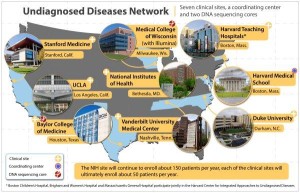UCLA Genetic Medicine Launches New Program
UCLA and their Department of Human Genetics has created a new program provide genetic testing to people with rare and unexplained genetic conditions. The department was created around the same time early efforts were being made to index the human genome, and while it’s the youngest science department in the UCLA school of medicine, it’s impact is already being appreciated globally.
The program is headed is by Drs. Katrina Dipple, Stanley Nelson, Christina Palmer, and Eric Vilian. When asked about the immediate goals of this new genetic testing program, Dr. Katrina Dipple outlined the mission of the center as ” Undiagnosed diseases take a huge toll on patients, their families and the health care system. The lack of a clear diagnosis can prevent patients from obtaining the correct care for their condition. Our goal is to quickly give patients a firm diagnosis and clarify the best way to treat them.”
UCLA Genetic Medicine Initiative to Solve Rare Diseases
People involved with the program will have access to intensive medical testing evaluations, consultations with UCLA medical specialists as well as advanced testing clinical testing, as well as DNA sequencing to uncover genetic conditions or anomalies that could be affecting diagnosis of the relevant medical issue.
The program is made possible by a 7.2 million dollar grant from the National Institute of Health , which will help to offset costs to patients and make these services accessible to those lacking adequate health insurance. The nature of the diseases and health issues that drive people to this program will most likely mean many of them have already exhausted current health care coverage or are very close to exhausting their insurance benefits. The initiative by the NIH which was started in 2012 and awarded to six medical centers around the county and aims to ” select from the most difficult to solve medical cases and together develop effective approaches to diagnose them”
Genetic Testing is one tool that these centers in conjunction with the UCLA Genetic Center, will use to help diagnose these rare cases. Medical cases such as these are quite often an enormous burden on both the families dealing with the undiagnosed issues, as well as the hospitals and medical programs attempting to treat them. In an extensive study from the Harvard Business Review there is an exorbitant amount of waste and ineffectiveness in dealing with even the most basic healthcare applications and treatments. This is only exasperated when dealing with these rare or hard to diagnose cases. With health care costs only expanding and one of the largest problems facing Americans today, this new initiative from both UCLA and the National Institute of Health is a necessary and welcome step.
Genetic Testing Leads to More Accurate Diagnoses
While genetic medicine or precision medicine as many have taken to calling it, will be able to help solve these extreme cases, there is real need for increased accuracy in diagnosing across all spectrums of healthcare. It is estimated that in-accurate diagnoses are responsible for 17% of adverse outcomes in healthcare. While we understand that genetic medicine alone cannot fix this issue entirely, the improvements made here will hopefully be communicated down to less extreme levels of care, and lead to industry wide improvements.
